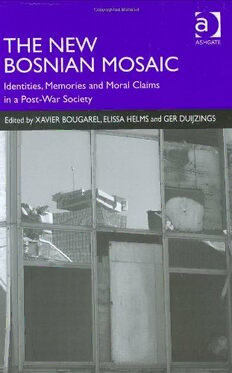
The New Bosnian Mosaic: Identities, Memories and Moral Claims in a Post-war Society PDF
353 Pages·2007·2.822 MB·English
Most books are stored in the elastic cloud where traffic is expensive. For this reason, we have a limit on daily download.
Preview The New Bosnian Mosaic: Identities, Memories and Moral Claims in a Post-war Society
Description:
Since the violent events of the Bosnian war and the revelations of ethnic cleansing that shocked the world in the early 1990s, Bosnia has become a metaphor for the new ethnic nationalisms, for the transformation of warfare in the post - Cold War era, and for new forms of peacekeeping and state - building. It has spawned an extensive literature, from journalistic enquiries to academic works, however much of this literature deals with the legal character of the war and the institutional framework set up by the Dayton Peace Agreement. The authors of this new book argue that while the realities of post - war Bosnia are indeed strongly influenced by Dayton and the way it has been implemented, they can in no way be reduced to it. This book is unique in offering a re-examination of the Bosnian case with a 'bottom - up' perspective. It gathers together political scientists and social anthropologists, some of whom began working on Bosnia - Herzegovina in the 1980s (including some from the former Yugoslavia) and others who discovered the country during and after the war. The authors consider both the specificities of the Bosnian case, discussing the difficulties of the peace process, especially in the crucial period between 1999 and 2003. However, the book also raises broader questions: What are the consequences of internecine violence and how should societies attempt to overcome them? Are the uncertainties and the transformations of Bosnian post-war society due entirely to the war, or are they related to wider processes encompassing post-communist Europe as a whole? And are the difficulties experienced by international protectorates mainly due to distinctive features of the local societies or are they due to the policies promoted by the organizations themselves?
See more
The list of books you might like
Most books are stored in the elastic cloud where traffic is expensive. For this reason, we have a limit on daily download.
